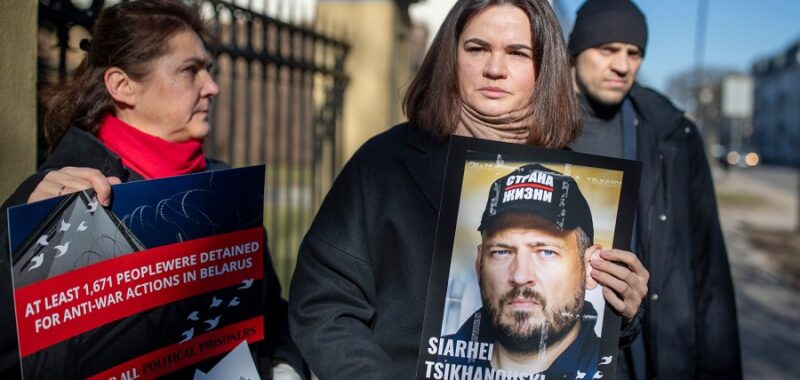
We are members of an exclusive club. No one would ever seek access to it, and everyone who joins wants to leave as soon as possible.
We were thrust into our roles because ruthless dictators imprisoned our spouses. Our journey began not as public figures but as supporters of our husbands’ courageous work. When they were unjustly jailed, we stepped into a new role: fighting for freedom and democracy, not only for our loved ones but for countless others suffering under oppressive regimes.
Sviatlana’s husband, Syarhei Tsikhanouski, was imprisoned in 2020 after daring to challenge Belarusian dictator Alyaksandr Lukashenka. He is serving a 19-year sentence for exercising his right to free speech. Since early 2023, he has been held incommunicado. Even his family has no contact with him.
Having survived two assassination attempts in 2015 and 2017, Evgenia’s husband, Vladimir Kara-Murza, was arrested in 2022 after calling out Russian President Putin’s murderous war against Ukraine. He was subsequently accused of high treason and sentenced to 25 years of hard labor. After more than two years in appalling conditions in a Siberian penal colony, Vladimir was released in a groundbreaking prisoner exchange last month.
We share our husbands’ deep convictions about the urgent need for democratic change in Russia and Belarus. We supported their work and accepted the inherent risks that came from their political activity. But we were mostly behind the scenes.
The outrageous actions of these dictators forced us directly into the harsh glare of the spotlight. They left us no choice but to become advocates and leaders. Now that we have found ourselves here, we can never stop.
Vladimir is home — a fact that feels like a miracle, and one that we know many are not granted.
Syarhei remains behind bars, and we will never cease in calling for his release.
Thousands more remain imprisoned across Russia and Belarus. Lukashenka jails journalists, bloggers, businesspeople, political figures and ordinary citizens, occasionally pardoning some for public relations purposes. Putin’s regime, in violation of Russia’s own Constitution and international law, imprisons anyone who dares to speak out against him, his war in Ukraine, or any matter he deems dangerous.
Many of these prisoners are not well-known. Their stories don’t make headlines. But their courage is no less heroic.
The human rights movement has a crucial role to play in securing their freedom. The release of Vladimir Kara-Murza demonstrates that coordinated international advocacy works. Pressure can force dictators like Lukashenka and Putin to face a hard truth: holding political prisoners is unsustainable when it becomes too costly.
But we cannot do this alone. We need the world’s most powerful democracies to act with determination. They must deploy every tool available, especially Global Magnitsky sanctions, to apply maximum pressure.
Unfortunately, Human Rights First has reported a steady decline in the use of these sanctions over the past three years, with both total and primary sanctions falling every year since 2020.
With so many people imprisoned for simply exercising their rights, now is not the time to ease off. We need more sanctions on those responsible for repression in Russia and Belarus.
We must also stand united with Ukraine. Putin’s war against Ukraine is not just an assault on one country but a war on freedom itself. Lukashenka’s regime is complicit, having let Russia use Belarusian territory as a launching ground for this criminal war. The fates of Belarus and Ukraine are intertwined. The freedom of Ukraine will pave the way for the freedom of Belarus, just as the defeat of Putin will signal the end of Lukashenka’s reign.
We call on the international community: do not forget the political prisoners. Do not ease the pressure on their captors. Support the people of Belarus and Russia who continue to resist, who still dare to dream of a future free from dictatorship.
This past week we jointly accepted the Lantos Human Rights Prize, which bears the name of the late Congressman Tom Lantos. He once said, “The veneer of civilization is paper thin. We are its guardians, and we can never rest.”
Sometimes people boldly stand as guardians and defenders of our human rights without any prompting — people like Vladimir, Syarhei and the late Alexei Navalny. Others find the courage to stand when they have been left with no other choice. No matter how we come to the decision, when we choose to stand against injustice and to stand as guardians of freedom, democracy and human rights — we make it impossible for the dictators of the world to win.
Freedom must triumph.
Evgenia Kara-Murza is a democracy activist and advocacy director of the Free Russia Foundation. Sviatlana Tsikhanouskaya is the leader of Belarusian democratic forces and head of the United Transition Cabinet.

